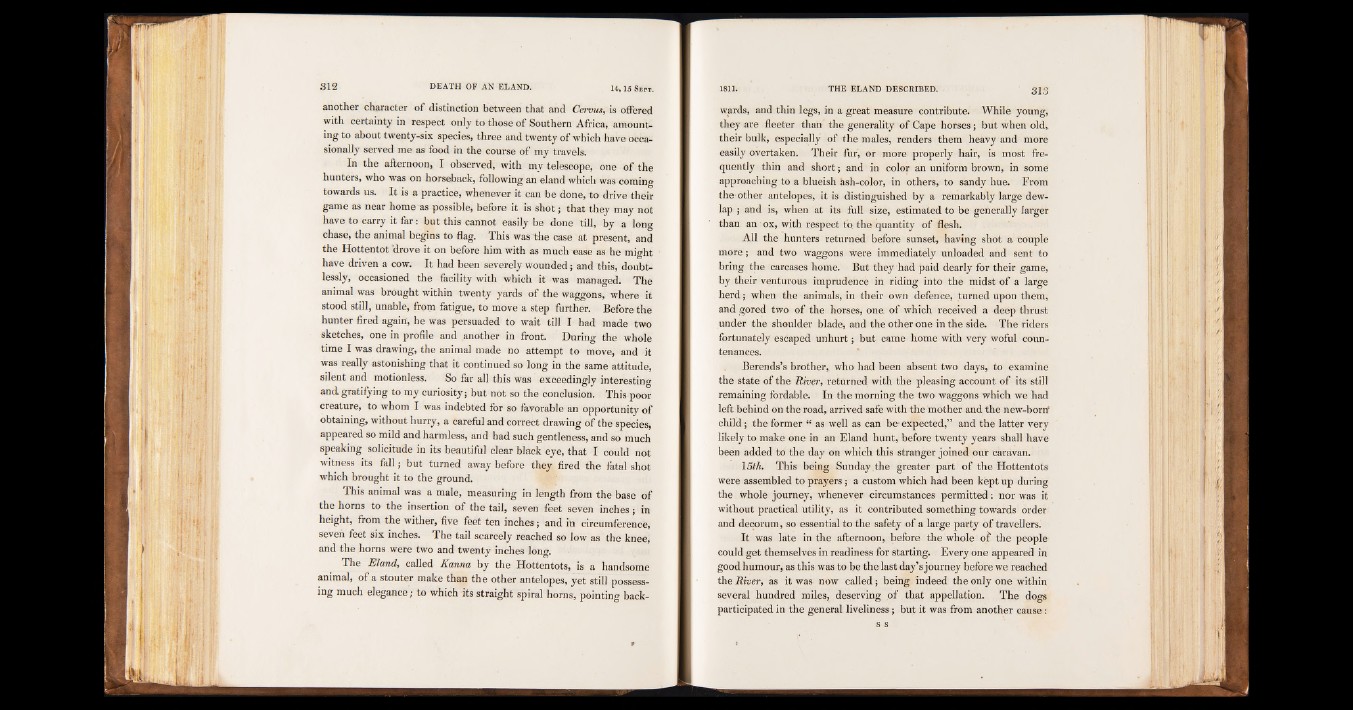
another character of distinction between that and Cervus, is offered
with certainty in respect only to those of Southern Africa, amounting
to about twenty-six species, three and twenty of which have occasionally
served me as food in the course of my travels.
In the afternoon, I observed, with mv telescope* one of the
hunters, who was on horseback, following an eland which was coming
towards us. It is a practice, whenever it can be done, to drive their
game as near home as possible, before it is shot; that they may not
have to carry it far: but this cannot easily be done till, by a long
chase, the animal begins to flag. This was the case at present, and
the Hottentot "drove it on before him with as much ease as he might
have driven a cow. It had been severely wounded; and this, doubtlessly,
occasioned the facility with which it was managed. The
animal was brought within twenty yards of the waggons, where it
stood still, unable, from fatigue, to move a step further. Before the
hunter fired again, he was persuaded to wait till I had made two
sketches, one in profile and another in front. During the whole
time I was drawing, the animal made no attempt to move, and it
was really astonishing that it continued so long in the same attitude,
silent and motionless. So far all this was exceedingly interesting
and gratifying to my curiosity; but not so the conclusion. This poor
creature, to whom I was indebted for so favorable an opportunity of
obtaining, without hurry, a careful and correct drawing of the species,
appeared so mild and harmless, and had such gentleness, and so much
speaking solicitude in its beautiful clear black eye, that I could not
witness its fall; but turned away before they fired the fatal shot
which brought it to the ground.
This animal was a male, measuring in length from the base of
the horns to the insertion of the tail, seven feet seven inches; in
height, from the wither, five feet ten inches; and in circumference,
seven feet six inches. The tail scarcely reached so low as the knee,
and the horns were two and twenty inches long.
The Eland, called Kanna by the Hottentots, is a handsome
animal, of a stouter make than the other antelopes, yet still possessing
much elegance; to which its straight spiral horns, pointing backwards,
and thin legs, in a great measure contribute. While young,
they are fleeter than the generality of Cape horses; but when old,
their bulk, especially of the males, renders them heavy and more
easily overtaken. Their fur, or more properly hair, is most frequently
thin and short; and in color an uniform brown, in some
approaching to a blueish ash-color, in others, to sandy hue. From
the other antelopes, it is distinguished by a remarkably large dewlap
; and is, when at its full size, estimated to be generally larger
than an ox, with respect to the quantity of flesh.
All the hunters returned before sunset, having shot a couple
more; and two waggons were immediately unloaded and sent to
bring the carcases home. But they had paid dearly for their game,
by their venturous imprudence in riding into the midst of a large
herd; when the animals, in their own defence, turned upon them,
and gored two of the horses, one of which received a deep thrust
under the shoulder blade, and the other one in the side. The riders
fortunately escaped unhurt; but came home with very woful countenances.
Berends’s brother, who had been absent two days, to examine
the state of the River, returned with the pleasing account of its still
remaining fordable. In the morning the two waggons which we had
left behind on the road, arrived safe with the mother and the new-born*
child; the former “ as well as can be- expected,” and the latter very
likely to make one in an Eland hunt, before twenty years shall have
been added to the day on which this stranger joined our caravan.
15th. This being Sunday .the greater part of the Hottentots
were assembled to prayers; a custom which had been kept up during
the whole journey, whenever circumstances permitted: nor was it
without practical utility, as it contributed something towards order
and decorum, so essential to the safety of a large party of travellers.
It was late in the afternoon, before the whole of the people
could get themselves in readiness for starting. Every one appeared in
good humour, as this was to be the last day’s journey before we reached
the River, as it was now called; being indeed the only one within
several hundred miles, deserving of that appellation. The dogs
participated in the general liveliness; but it was from another cause:
s s